“We’re at this point where we’re writing all these social and political songs, but we feel like a party band.”
Vancouver’s Stiff Valentine have a lot to say. Founded by producer-guitarist and American ex-pat Chris DeMarcus in 2003, the band’s current incarnation as a three-piece mechanized rock juggernaut is the result of years of line-up and sound changes and a gauntlet of live shows across Canada and the States that have left the band bloodied (literally in some cases), but unbowed. As the follow-up to their “>Chris Peterson produced 2011 album American Bleeding on Chicago’s WTII records, the band is releasing a remix album American Inbreeding, on Valentine’s Day appropriately. I Die: You Die sat down with the notoriously opinionated “Loud” Chris and keyboardist and co-vocalist Kerry Peterson to chat about where they fit under the industrial umbrella, the difficulty of touring and how to stay motivated in the current musical climate.
ID:UD Why did you guys decide to do a remix album? A lot of what you’ve done before is collaborative – you’ve worked with other bands and you have relationships with other bands, but a remix album is a very electronic project in many ways, where Stiff Valentine skews towards the rock side of things.
Loud Chris: The biggest thing is that we’re a rock band in a sea of non-rock bands, and we love both, so we’re trying to push elements of EBM as far to the organic rock side of things as possible. Some bands go very EBM, arpeggiators, everything sequenced, and some are like rock radio bands with nothing like that. We play with tracks like everyone does, but we play with it and change it, it’s an organic thing. For our next two shows coming up the set is different, we can change it, have it serve us. You can go off, but you still have to be in a pocket with the machines, so it’s still mechanical in that way. We wanted to steer over to that side. It’s a big collaborative effort, but I’m always at the helm of everything, so for once I can kick it over to other people and see what they come up with and all this different stuff comes back. It’s all over the place, it’s got hip hop stuff, EBM stuff. The first few tracks are pretty rockin’ before it goes off to electronica. There’s hints of dubstep coming in on it, it’s cool to do that. Everyone’s close friends on it except Vein Collector, I think.
Kerry: And am.Psych, but we met them at the festival (WTII fest).
LC: Yeah, and they did that a while ago. This was to highlight that we do both. If we’re playing a rock club we play a rock set, if it’s a dance night we’ll do something more dance oriented. You know like, Rob Zombie plays the same set every night with the same jokes. The same everything.
Kerry: We change it up all the time depending on the other bands we’re playing with, or what kind of night it is.
LC: It’s always changing. Machine rock is my favourite term, it’s rock but it’s still mechanical. We’re trying to do the best of both worlds, something new. We have so many friends who do so much stuff, we’re just kind of bored of the 1, 2, 3, 4 *Chris counts off a 4/4 drum beat*
Kerry: I love my dance music though. I can’t help it. It’s like, “Can we do a techno song?” *laughter*
ID:UD It’s got to be weird to be booked in the industrial scene because it’s such a catch all for so many things. You guys are kind of a unique quantity in that scene in that there’s no one else do exactly what you do. How do you find Stiff Valentine fits in?
LC: It can’t just be me and Kerry and a laptop. We have to have a band, we need a drummer.
Kerry: It started that way though.
LC: Yeah it did. I got immediately bored with it. It’s important to know your audience, though. You can’t play a country song for a goth crowd. Getting booked, though… I mean how do bands get on a tour? 99% of the time it’s who has the most money, and then relationships, like who do you know. So, if you want to tour with Combichrist, you can’t be a full band, you can only afford one or two guys to go out. So we’ve got eight people on stage sometimes, sometimes it’s just three. Whatever we can make viable. Everyone’s hurting everywhere. Gas, you never used to think about it on tour, now it’s the number one thing, all we think about. *laughter*
ID:UD Going back to the remix album, some of the mixes have been around for a while, only appearing on comps or what have you. Was there anything new that came in that you really surprised you when it came back? Any different directions you weren’t expecting?
LC: Totally. Slave Unit did their thing, a big bass guitar groove, it reminds me of old Thrill Kill Kult. This guy Dave Renton who’s a local guy and hasn’t really released anything did a cool mix, it sounds like industrial hip hop to me. Vein Collector I’ve never heard before, but they did a more EBM thing.
Kerry: Jared [Slingerland of Front Line Assembly] and Craig [Jensen, guitarist] took a real epic take on it. They like hip hop but also rock music so their interpretation was cool. They combined two songs into one, they used samples of my vocals from another one of our songs, “Good Enough”.
LC: I’m always a contributing member to SMP, so I knew what that mix was gonna sound like. Me and Kerry worked on a mix. She was like the producer.
Kerry: I wanted a really techno version of one of our tracks. It reminds me of kids at a rave, it’s almost silly.
LC: I feel like I’m in a gay bar when I hear it.
“They’ll be in front of my keyboard like ‘where’s your fuckin’ bass player?’ And I’m like, ‘I am the bass player!'”
ID:UD If you were to try to explain the elements of Stiff Valentine to someone, that it’s rock but industrial, they might say “that sounds like American coldwave”, but that doesn’t really describe it, there’s no breaks.
LC: It’s difficult being a record engineer and trying to come up with one term to sum it up, and really when you look at most genres of music it’s all rock music, whether it’s pop music, a massive Nickelback type band, or hip hop, it’s all rock music. Everybody wants to get really specific to describe things which is cool, but you lose that umbrella effect. If you wanna book a show it’s like “well, these guys are EBM and these guys are coldwave, can we put them together?”, and it used to be okay to do that. Hard rock is a term that works, but that doesn’t sound sexy. You can’t sell that. Machine rock’s the only thing I can come up with. It’s difficult to talk about without getting into the technical side of writing music, but the difference to me is between a straight up 4/4 beat or a rock beat or a funk beat. We use a lot of funk beats. They might be going fast, but rock n’ roll has been doing this forever, it’s more of a bluesy rock type thing. If you say “it’s a bluesy thing” to someone they’re gonna be like “that doesn’t sound fun, that sounds like something my grandpa would listen to”, but if you’re familiar with the roots of music at all it all goes back to blues. Every interview we have it’s like “how do you sum it up”, and I’m like “I wanna give you that one line that sums it up but I can’t.” Machine rock works.
Kerry: I say industrial, metal, punk to people sometimes. Like when you’re on tour and in a gas station somewhere and they’re like “y’all in a band?” People outside of the scene don’t even know what industrial means most of the time. Sometimes we’ll play metal shows and the crowds can be tough. They’ll be in front of my keyboard like “where’s your fuckin’ bass player?” And I’m like, “I am the bass player!”
LC: We’re an alternative rock band, but I also consider Nitzer Ebb to be an alternative rock band.
“One thing that really bothers me about keyboardists on stage, they’re either one-fingering it or not doing anything behind this big wall of gear.”
ID:UD We’re pretty sure the first time we saw Stiff Valentine play was you and Adrian [White of Strapping Young Lad, Front Line Assembly, Melt] and it was a very different sound.
LC: It started out as a one-man thing because I lived in a small town in the states where nobody wanted to do anything. That’s why I originally came to Vancouver, because Chris [Peterson, who has entered the room thirty seconds previously] who I’d talked to once on the Internet seemed like he knew what’s going on, there seemed to be things going on here. I moved here and met Chris, Michael Balch [of RevCo, FLA, Will, Decree], and Isaac [Terpstra, aka DJ Pandemonium of Sanctuary] and they we’re like “there’s nothing going on here” because there was a lull going on. I wanted to be like Suicide really bad, like a poor-man’s Skinny Puppy, but it just didn’t work, it was posing, I didn’t really know what I was doing. It was too simplistic and not satisfying to me at all. I wanted to get a drummer in and make it a three piece band. Kerry came in just to play samples…
Kerry: The first show I ever played with you was at the Columbia and it was just me and you. I’d been to a bunch of shows, and you were like “well, you already know the songs you can do this”. I was on the roof of a warehouse party at midnight two days before the show and I got a drunk phone call from you like “you gotta do this” and of course I agreed. And then the next day I was like “I don’t know if I can actually do this.” We had like one tiny little rehearsal and did a cover of Dismantled’s cover of “Straight Up” and a couple of the other songs from way back.
LC: They were pretty dance oriented. The main thing I was interested in was whereas most people in the synthesizer scene where you can hide behind things are like “do I look good”, Kerry was like “I wanna know what to do, I don’t wanna fuck up, I wanna get it right, I wanna practice.”
Kerry: I didn’t want to go up and not play. That’s one thing that really bothers me about keyboardists on stage, they’re either one-fingering it or not doing anything behind this big wall of gear. Because I’m a girl I felt like I would have more of that thrown at me, more negativity thrown at me.
LC: Most people get on a sampler for the first time and it sounds like crap, but Kerry would do stuff and within thirty seconds she’d have it dialed in musically, it wasn’t just mashing knobs.
ID:UD There was a point where the SV line-up ballooned up, where you had Craig [Huxtable, keyboards, of Landscape Body Machine], the other Craig, Adam [Johnson, bass], Jared, you guys. Galen [Waling, drums, of Left Spine Down] as well. The line-up seems to have pared down to you guys and Galen. Is that just a financial decision with touring and playing live? Or is it a natural progression?
LC: I hate to admit the truth, but it’s like you’ve got to deal with what you’ve got. For Craig to come in from the island (Vancouver Island) the costs are out of control. It’s a different sound, I’d say tighter, but the main reason to do music is for fun. You can subsidize your living. Some people do it for notoriety. Some people do it to put do it for art, to put forward a message of truth and honesty. But fun is a huge aspect of it, and it got to a point where there was too many people and it wasn’t fun at all. Then there was hard decisions to make. When you have so much gear to set up, so much in the way of logistics and no money, you need to ask “What do we do to still make this fun?” So we call it the core. There’s the three of us. Anyone else when they can play, that’s cool. When they can’t, that’s cool too. Touring right now is tough. You can’t buy on to a tour with more than three people because the costs go up. You can’t travel. Some people are sad when they can’t play a show, and I’m like man, in some ways I’d rather be you. *laughter* I think all bands are in it to have fun. I’m sure Combichrist is having fun. Opening for Rammstein, that seems fun. *laughter*
ID:UD Your 16Volt cover seems pretty different than other stuff you’ve done. It’s combining things in a new way. Is that indicative of a shift in your sound?
LC: First of all, it’s easier to cover a song that’s already good. Our version is pretty different. The mix is different, there’s this wobbly bass, it’s a wall of sound. Is it a rock song or a dance song?
ID:UD We think it’s a dance song.
Kerry: It sounds like more of what we do live. That was one of the first recording where I use my live voice, that’s the yelling I use live. Even when we play songs like “Believe” or “Good Enough” live, on the recording I might sound girly, but live I don’t do that, I’m trying to go off Chris. That’s my imitation of him. *laughter*
LC: Things will probably lead in that direction, we’re writing a new album. It’s less thrash metal and more groove metal. There’s more melodic breaks too. I like to write like, Cure guitar lines.
Kerry: There’s more string patches in the new material than before.
ID:UD Is that a function of new work you’ve been doing live, and outside of SV?
Kerry: Especially working with SMP and Unit 187, lending bits and pieces to those projects has been a pretty big influence on our sound over the last year.
LC: We’re at this fine line where we’re at this point where we’re writing all these social and political songs, but we feel like a party band.
ID:UD Speaking of which, we’ve talked to a lot of people about the distinction between making substantial and humorous music. For example, your website is secondbestcanadianbandever.com.
LC: That’s a rhetorical website. I’m a student of political science. I’m into human conflict, but I also want to take things less seriously. How can someone take me that seriously when I’m playing a small bar for 200 people? I love a guy like Caustic, because he can make everything on stage a joke, and it makes so many people mad! It’s like, how can you take yourself seriously when you’re wearing a cape? Isn’t goth supposed to be fun? When I dressed up in high school I was having fun doing it.
ID:UD Chris, what can you tell us about Deathproof? Are you guys doing an album?
LC: We just started an album. Kerry is on it, Jason [Bazinet, of SMP] obviously, it’s gonna be huge, ultra-violent, just big sounding stuff.
Kerry: “Bitcrush” is a Deathproof song, we stole it and made it into a live SV song, but it’ll be on the record.
LC: Deathproof is two things. It’s coming together as a band, but it’s a production group. Sometimes Jason will do a mix and do 90% of the work and I’ll do 10%, or the other way around, but it’s like the Matrix or any of those other big production teams. Nine Inch Nails has always been like that, like it’s Trent Reznor but there’s been times when it was like 30 people working and writing. Now it’s all Atticus Ross because the technology is there. It used to be guys like Vrenna. Deathproof is kinda like that, we do remixes, programming, album production. All on a sliding scale and we combine our credits. I’ve done stuff for corporations like Subway and eTrade, I did a Jewel song for the show “Men in Trees”. *laughter* Jason has done all kinds of underground stuff. We’re doing the band thing, but we have so much else going on we’re kind of wondering who’s gonna pay attention. Whenever we’re in the studio we do paying work, and then we do some remixes for free.
ID:UD You guys are very different sonically than anyone on your label, and from the majority of other folks in the industrial scene, to the point where it’s sort of difficult to see where SV fits into it. We’re curious as to why you guys play in the industrial scene with industrial bands at shows and so on, rather than in the punk and metal scene.
Kerry: We don’t really fit in with those bands either. A big part of it is all of our peers and the people we work with. I push for it to because I’ve been part of the industrial scene for so long. Also, you know, we have the electronics and that means we don’t totally fit into the metal or punk scenes necessarily, but with all the EBM, our guitar sound means we don’t totally fit in a typical way either.
LC: A lot of is just the people we know. If I’m gonna put out a record, Roadrunner isn’t gonna put it out. I guess the only other genre we have a lot in common with is hardcore. Since we’re kinda outcast it’s kinda fun to be on an outcast label like WTII as well. The only other band we sound like on there is Acumen Nation, we sound like them a little bit.
“I thought industrial bands were gonna play every night. It was a lot like where I came from though, a lot of people talking but not much going on.”
ID:UD As Vancouver residents and industrial fans, we’re always interested in how people perceive the city when coming from elsewhere. coming from the States, what was your understanding and idea of Vancouver’s industrial scene before moving here? How has that changed?
LC: It used to be a mecca because of Skinny Puppy, but it’s weird, I mean they were even old news before we moved here. I originally came here to make films, I wanted to be Kevin Smith.
Kerry: Same here. I went to school here and studied video and film as my majors.
LC: I literally arrived just as the music industry was going through a revolution, right at the tail end of it. I went from working in a a giant recording studio to a school, they changed it into a school to make money. Every aspect of the industry has been turned on its head and commercialized to stay afloat. For me, in the States Delerium is an underground band, the Tea Party were an underground band, but here they were on the radio! That’s what I thought was here, but there was very little going on. It’s getting better, but when I showed up everyone was like “Yeah, everyone moved to LA or Chicago.” I stay because I like Canada as a society. People seem sane here. That’s why I stay. Insane people are fun, but they’re also terrifying, which is why I stayed. I thought industrial bands were gonna play every night. It was a lot like where I came from though, a lot of people talking but not much going on. That’s changing though, we’ve got Left Spine Down, there’s us. There’s kind of a scene going on again, and that’s cool. It’s tough slogging, but it’s tough everywhere for live shows. I love the LSD guys, they have this Vancouver cyberpunk pride, it sort of reminds me of that movie 24 Hour Party People…claiming the city. I can’t necessarily have the same civic pride, but I think it’s cool.
Kerry: I transferred from OCAD to Emily Carr so I was part of the Toronto scene for a few years, where there was lots of clubs, lots of places to play in bands. There was something going on almost every night of the week. It was different when I moved here.
LC: It’s super expensive here. It’s cheaper for us to drive to Seattle and Portland and play two shows than it is for us to do a show in Vancouver because of rental fees at the venues, who are trying to pay their rent too. It’s not the bar’s fault.
“300 years ago there was no music industry. So why are we all sad that no one can make a living now?”
ID:UD: With economics making it so difficult to tour and record, we’re curious what motivates you to keep doing so. If it’s the fun of being in a band and playing, then why do more than just play local shows and just do home recordings for your own use?
LC: It’s a huge sense of adventure. But it’s also it’s also who we are. We won’t stop, we can’t. It’s more powerful than anything, it’ll motivate you no matter what. That’s why some bands come and go, but some will always be around because it’s what they have to do.
Kerry: Even when I was making films and videos, music inspired everything I do. I have it on me 24 hours day.
LC: It’s weird because 300 years ago there was no music industry. So why are we all sad that no one can make a living now? You roll with it, it’s not gonna stop people from making music. Music is a plaything of the rich, it’s a luxury.
Kerry: You can have a gold record hanging on the wall and still have to work a day job. I was devastated when I found out Susan from Switchblade Symphony had a job as a stripper, as a young goth girl who adored them. Not because of the job itself, but like she had to do that and not just music.
LC: Playing on stage is like a drug, it’s the most addictive thing ever. It’s cool when your friends are there, but when more people are there and into it… Saul Williams described it perfectly, in the moment it’s like a hallucination. It’s like a runner’s high.
Kerry: Even just going out for a week is important to us. I’ll save up my vacation days, save up my money. To me it’s a vacation where we get to play, which is work I guess, but it’s really fun work. *laughter* You still have to be focused and do your job.
LC: It’s an age old story. Lots of artists never make it big, some only do after they die, but they did it just to do it.
The Second Best Canadian Band Ever’s new remix album American Inbreeding is out February 14th on WTII records. Give it to your sweetie for Valentine’s day.

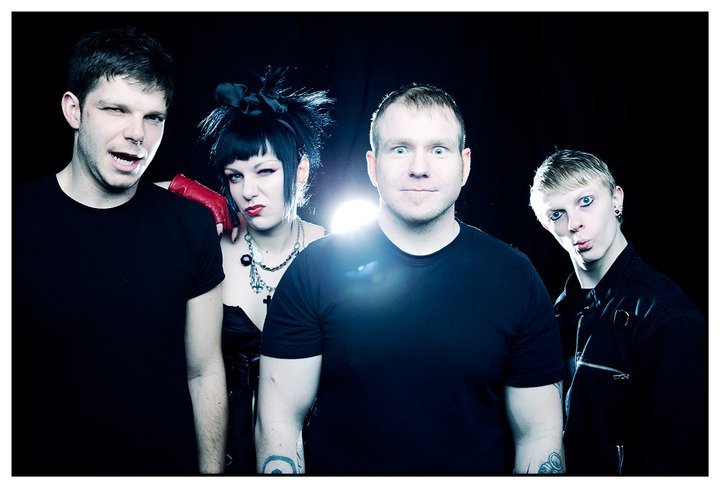
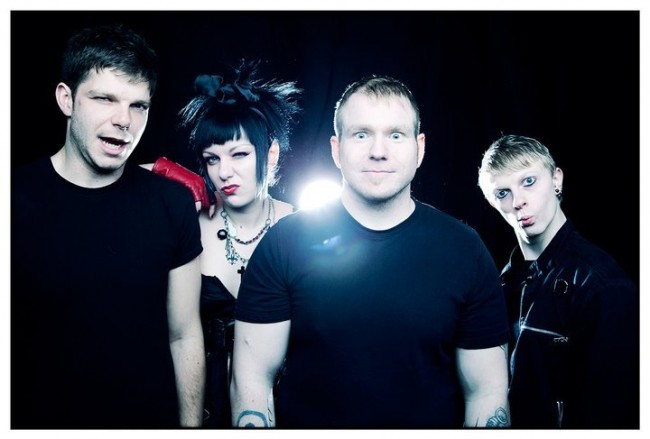
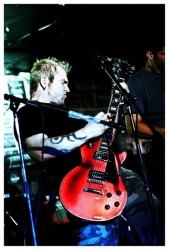
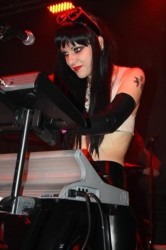
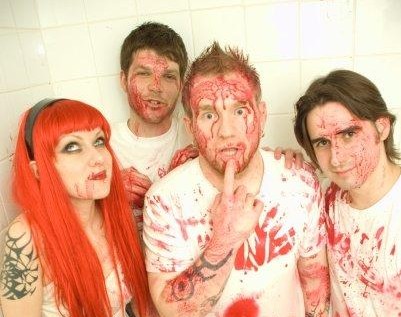
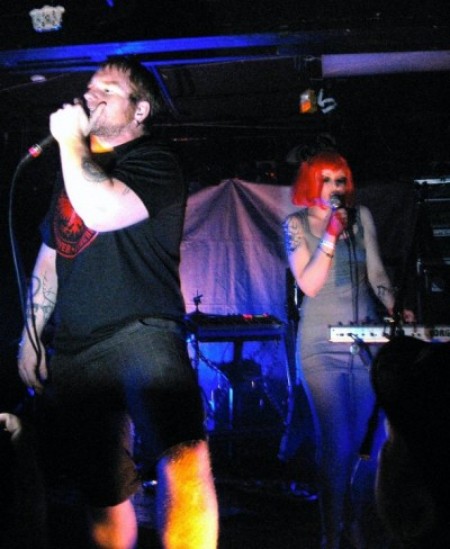
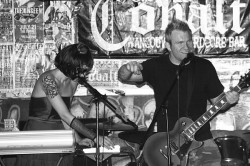
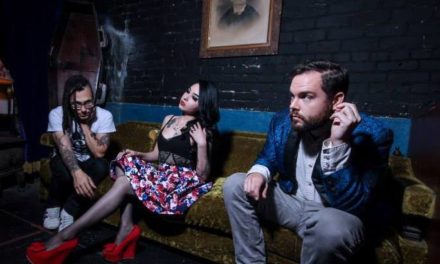
![An Interview With [:SITD:]](https://www.idieyoudie.com/home/wp-content/uploads/2011/10/sitd-440x264.jpg)
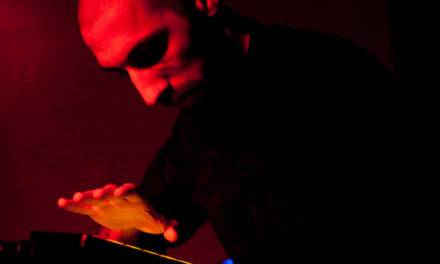
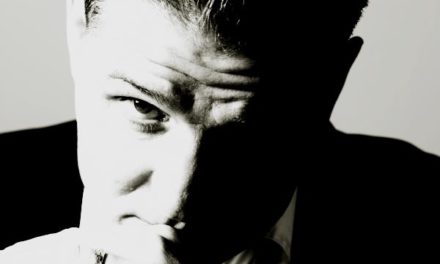
Trackbacks/Pingbacks